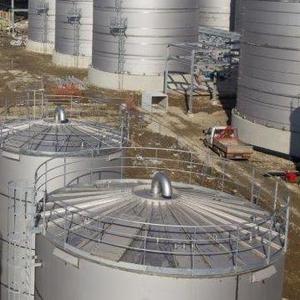Global cellulosic ethanol developments

March 14, 2016
BY Susanne Retka Schill
The Italian chemical company, Mossi & Ghisolfi Group, lays claim to being the first to bring a large, 20 MMgy cellulosic ethanol plant online at Crescentino, Italy, in 2012.
“Crescentino is now operating at industrial scale and on a daily basis, producing large quantities of cellulosic ethanol that are shipped into Europe, thanks to a long-term contract with an oil company,” says company spokesman Silvia Sacco. “The hurdles found during the first 15 months of prolonged start-up have been overcome and the actual configuration of the plant proves to be sustainable for steady state production.”
Beta Renewables is the company within the M&G group formed to license the trademarked Prosea technology. Chemtex International and Biochemtex are companies within the M&G Group developing projects, including Project Alpha in North Carolina. A Brazilian company, GranBio, was the first to license the Prosea technology and has brought its commercial-scale facility online.
GranBio’s cellulosic ethanol production began in September 2014, at Bioflex Agroindustrial in Sao Miquel dos Campos, Alagoas, Brazil. The company is using Prosea pretreatment technology from Beta Renewables in the 20 MMgy plant, enzymes from Novozymes and started up with yeast from DSM. In mid-2015, GranBio announced it had received approval for its own proprietary yeast capable of fermenting both C5 and C6 sugars present in sugarcane straw and bagasse.
GranBio’s plant was the only foreign facility registered to generate D3 RINs for cellulosic ethanol on the U.S. EPA’s Part 80 list in February. In its discussion of projected cellulosic volumes for 2016 in the final rule, EPA included GranBio in its table of plants that had not yet achieved consistent commercial-scale production. The agency projected a conservative range from zero to 2 million gallons from GranBio to be applied to the 2016 RFS volumes in the U.S.
Other projects were announced in 2014. In Europe, Energochemica, a Slovak company, bought the second license from Beta Renewables. Its plant is under construction, with startup expected in 2017. In China, M&G Chemicals and Anhui Guozhen created a joint venture to produce cellulosic ethanol and bioMEG, a base chemical used in plastics. With the big drop in oil prices affecting fuel and MEG prices, the project is being reviewed to ensure profitability is still attractive, Sacco reports. “M&G Chemicals decided that in order to optimize certain costs and yields, it is necessary to integrate design changes to the process that have been made and tested in Crescentino. Expectations are to be able to update the project economics in the second half of this year and to get the green light to start execution by year end.” Start-up is projected for late 2017. Two other projects are in earlier stages of development. One in India with CVC Infrastructures Ltd., and another in Malaysia with Brooke Renewables Sdn.
Author: Susanne Retka Schill
Senior Editor, Ethanol Producer Magazine
701-738-4922
sretkaschill@bbiinternational.com
Advertisement
Advertisement
Related Stories
The U.S. exported 31,160.5 metric tons of biodiesel and biodiesel blends of B30 and greater in May, according to data released by the USDA Foreign Agricultural Service on July 3. Biodiesel imports were 2,226.2 metric tons for the month.
CARB on June 27 announced amendments to the state’s LCFS regulations will take effect beginning on July 1. The amended regulations were approved by the agency in November 2024, but implementation was delayed due to regulatory clarity issues.
Legislation introduced in the California Senate on June 23 aims to cap the price of Low Carbon Fuel Standard credits as part of a larger effort to overhaul the state’s fuel regulations and mitigate rising gas prices.
The government of Brazil on June 25 announced it will increase the mandatory blend of ethanol in gasoline from 27% to 30% and the mandatory blend of biodiesel in diesel from 14% to 15%, effective Aug. 1.
The U.S. EIA reduced its 2025 and 2026 production forecasts for a category of biofuels that includes SAF in its latest Short-Term Energy Outlook, released June 10. The forecast for 2025 renewable diesel production was also revised down.
Upcoming Events









